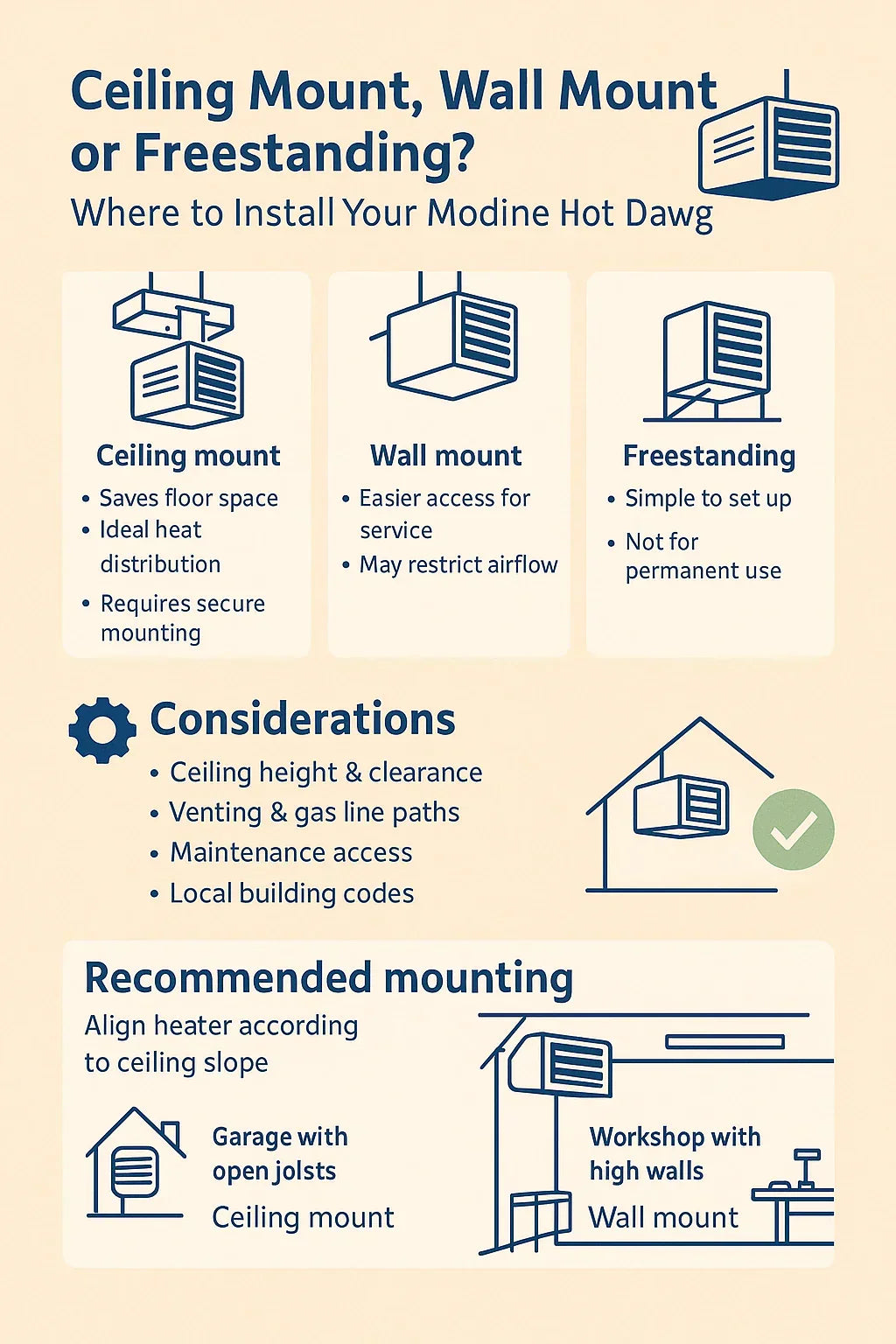Targeting: Savvy homeowners, DIYers, and pros setting up heating for garages, workshops, and sheds.
🛠️ Introduction: Placement = Performance
When it comes to the Modine Hot Dawg 75,000 BTU natural gas unit heater, where you install it can have a massive impact on:
-
Heat distribution 🔥
-
Energy efficiency 💸
-
Safety compliance ⚠️
-
Space optimization 🧰
This guide explores the three main mounting styles—ceiling mount, wall mount, and freestanding—and which makes the most sense for your space.
We’ll help you evaluate:
-
Ceiling height and clearance
-
Venting paths
-
Maintenance access
-
Local codes and real-world examples
Let’s find the perfect home for your Hot Dawg.
🔧 Overview: Installation Styles for the Modine Hot Dawg
| Mount Type | Description | Best For | Key Drawback |
|---|---|---|---|
| Ceiling Mount | Suspended from ceiling joists using threaded rods | Large, open garages | Requires secure framing |
| Wall Mount | Side-mounted using angle brackets | Workshops with low ceilings | May limit airflow |
| Freestanding | Set on a platform or shelf | Temporary setups or mobile buildings | Not recommended for long-term |
📎 Modine Hot Dawg Mounting Manual (PDF)
🏗️ Ceiling Mount: The Gold Standard for Most Installs
Ceiling-mounting is Modine’s recommended default configuration.
✅ Pros
-
Keeps the heater out of the way
-
Maximizes floor space
-
Excellent heat throw and air circulation
-
Ideal for garages, pole barns, and shops
❌ Cons
-
Requires solid framing and joist anchoring
-
Harder to service in some layouts
-
Vibration dampening may be necessary
🔩 Hardware Needed
-
Threaded rod (½" or ¾")
-
Mounting brackets or angle iron
-
Locking nuts and washers
-
Pipe clamps or hangers
📎 GarageJournal Ceiling Mount Example
📐 Sizing for Ceiling Mounts
Modine recommends:
-
Minimum 1" clearance above unit
-
Minimum 2" clearance from back and sides
-
Minimum 18" below the unit
-
Mount height between 7 and 14 feet, depending on model
Ideal angle: Mount at a 5–15° downward tilt to blow warm air toward floor level.
🧱 Wall Mount: When Ceiling Isn’t an Option
Wall-mounting is uncommon but possible with reinforcement.
✅ Pros
-
Good for tight mechanical rooms
-
Easier access for maintenance
-
Better fit in buildings with cathedral or angled ceilings
❌ Cons
-
Can restrict airflow on one side
-
May require side venting
-
Needs solid backing and bracket kits
🧰 Use When:
-
Your joists can’t support ceiling weight
-
You have only partial ceiling access
-
You need lateral airflow across a narrow room
🧍 Freestanding: Not Recommended for Permanent Use
Freestanding installation is not recommended by Modine for any permanent application, but it can be seen in mobile shops or temporary sheds.
✅ Pros
-
Quick setup
-
No drilling or bracketing
-
Can be used during reno/construction
❌ Cons
-
Safety hazard if bumped
-
Voids Modine warranty if permanent
-
Difficult to vent properly
🔔 Only consider freestanding if the unit is on a non-combustible platform, and for temporary use only.
🌬️ Venting Considerations by Mount Type
| Mount Type | Best Venting Style |
|---|---|
| Ceiling | Vertical or concentric horizontal |
| Wall | Horizontal only |
| Freestanding | Difficult — not recommended |
Always use Category I or III venting and follow local building codes for combustion clearance and piping.
🔌 Electrical Access: Location Matters
Make sure your chosen mount allows:
-
Unobstructed access to the wiring compartment
-
Proximity to the thermostat (24V)
-
Access to a 110V or 120V outlet (for fan models)
Bonus: Use a Wi-Fi thermostat mounted nearby for remote control (learn more in Topic 6).
🧱 Real-World Example Layouts
🛠️ 3-Car Garage with 10 ft Ceilings
-
Mount style: Ceiling
-
BTU: 75,000
-
Vent: Horizontal with concentric kit
-
Mount height: 8.5 ft
-
Air direction: Angled 10° downward
🪚 Insulated Woodshop with 12 ft Ceilings
-
Mount style: Wall (joists unavailable)
-
BTU: 60,000
-
Vent: Horizontal sidewall
-
Tilt: 15° downward toward center
🧰 Mobile Job Site Shed
-
Mount style: Freestanding on platform
-
BTU: 30,000
-
Vent: Temporary pipe
-
Use: 3 months only during renovation
📏 Key Specs to Check Before Mounting
| Requirement | Ceiling Mount | Wall Mount |
|---|---|---|
| Min. overhead clearance | 1" | 1" |
| Side/rear clearance | 2" | 2" |
| Front clearance | 18" | 18" |
| Combustible materials nearby? | No | No |
| Vent pipe run ≤ 50 ft? | Yes | Yes |
📎 Modine Hot Dawg Engineering Manual
⚠️ Local Code + Safety Must-Haves
-
UL or CSA certified mounting hardware
-
Seismic zones: use vibration-resistant anchors
-
Minimum height from floor: often 7 ft
-
NO flammable storage under heater
-
Double-check vent pitch and condensation traps
✅ Final Recommendations
| If you have… | Use this mount |
|---|---|
| Open garage ceiling joists | Ceiling |
| Sloped ceiling or no joist access | Wall |
| Temporary use or uninsulated shed | Freestanding (short-term) |
🔚 Conclusion: Let Form Follow Function
The Modine Hot Dawg is designed with flexible install options—but placement still matters. Mounting your unit properly ensures:
-
Better comfort
-
Longer equipment life
-
Easier servicing
-
Lower energy waste
The ceiling mount is the best choice for most homeowners. But with the right prep and hardware, wall mounting is just as effective when ceiling access is tricky.
In the next topic we will read about: Can You Install the Modine Hot Dawg Yourself? DIY Tips vs. Calling a Pro







